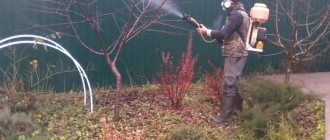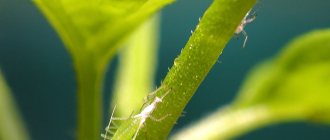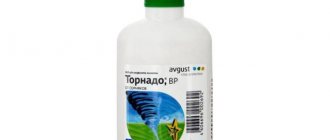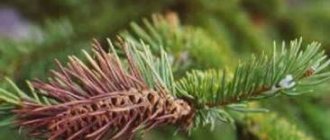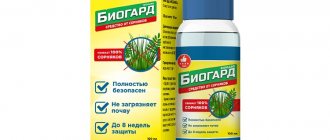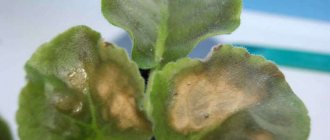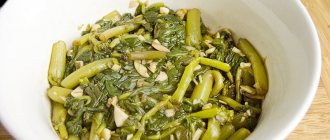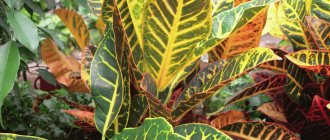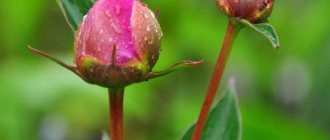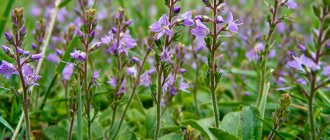Aphids are an unwelcome guest in any garden.
Eating plant juice, she does not disdain almost any garden crop, even turning her attention to fruit trees, shrubs and flowers. Dear readers!
For you, we have created communities on social networks in which useful articles and interesting ideas are published several times a day! Subscribe and receive useful content in a convenient format! If no effort is made, the damage caused by the aphid may be noticeably greater than its size . The thing is that the pest is dangerous not in itself, but in its quantity. Aphids multiply unimaginably quickly, growing in just a few days to entire hordes capable of “bleeding” your favorite plants one by one.
Obviously, complete inaction will lead to only one thing - uncontrolled reproduction of the insect until there are simply no healthy plants left on the site.
If aphids have chosen roses, this is manifested by the drying out of most of the foliage, stems and shoots, and in the most difficult cases, even the death of part of the bush. A rose affected by aphids is often unable to even open the buds of its flowers.
What does the pest look like?
Aphids are very small insects that rarely grow more than 1-3 mm in length. However, it is not difficult to notice this pest, because it is practically never found alone. If aphids find ideal living conditions, they begin to multiply quickly, sometimes reaching hundreds of individuals on one particular plant in just a few days.
The body of an aphid is almost always colored in the color of the plant on which it lives. Most often it is green. She has noticeable antennae on her forehead, which are responsible for hearing and touch. Aphid vision is considered better than most other insects.
The aphid's mouth is a proboscis with which the insect pierces the surface tissues of stems or leaf blades, after which it sucks the juices out of them. There are aphids that can fly, and there are wingless individuals. Some species are excellent jumpers.
Aphids live over vast territories: in Western Europe, Siberia, and the Far East. The insect does best in humid and temperate climates. The peak of reproduction is fixed at the optimal temperature without sudden changes: if there are no droughts or heavy rains.
Aphid food is plant juice. Actually, by absorbing more and more juice as the population grows, this insect causes the greatest harm. In addition, aphids are dangerous because they can carry plant viruses, infecting healthy crops.
There may be several reasons why aphids appear on roses . It can simply simply switch from another culture. Or there are factors that are not at all obvious, because it is known that ants breed aphids. They love to feast on the sweetish secretions from aphids, which, by the way, are nicknamed “ ant cow” . This means that aphids can “graze” on roses at the will of the ants that have settled nearby.
Signs
The main signs of an invasion are visible to the naked eye:
- leaves and petals curl and become deformed;
- in the first stages of infection, they turn red, their tips gradually dry out;
- eventually they turn completely black or yellow and fall off;
- the bushes are completely covered with a large number of small insects, covered with a sticky, shiny liquid (honeydew), which attracts other insects, literally a cloud of curling around;
- ants appear that were not on the site before (or that settled at a completely different end of the garden).
It is important to recognize in time that roses have been attacked by aphids. The earlier a problem is detected, the easier it is to deal with it. Aphids multiply very quickly and spread from one plant to another, infecting the entire garden. Therefore, for preventive purposes, it is so important to constantly inspect flowers (and other crops growing nearby) for the presence of these pests.
How to treat aphids - effective drugs?
In the vast majority of cases, aphids begin to settle on roses in early and mid-spring . At this time of year, it is enough to carry out preventive treatment to repel the pest in advance.
But there are seasons when aphids attack garden crops literally throughout the warm season. Then it will not be possible to do without modern effective drugs to combat the pest.
- Aliot (Malathion, Carbofors) is a phosphorus-containing agent that enters the body of aphids through the oral cavity.
- Aktara is a neonicotinoid insecticide that acts on aphids by intestinal contact.
- Biotlin is a neonicotinoid insecticide with enteric contact action.
- Tanrek is a neonicotinoid insecticide with enteric contact action.
- Spark - Double effect - belongs to the class of pyrethroids, affects aphids by intestinal contact.
- The spark is golden . Neonicotinoid insecticide with enteric contact action.
- Fufanon is a phosphorus-rich product. Impact of intestinal contact nature.
There are also biological products that are used to prevent the appearance of aphids. It is better to give them preference before the start of the warm season.
- Aktofit is a biopesticide, an insecticide with enteric contact action.
- Bitoxibacillin is an intestinal pesticide.
- Spark BIO is a light insecticide that affects the digestive system of aphids.
- Fitoverm is an enteric contact insecticide.
What are the dangers of chemical treatment?
Chemicals can be used to control pests on roses without fear. It is on fruit trees and other crops, the harvest of which is then used for food, that you need to be careful. Roses are grown exclusively for decorative purposes.
On the other hand, rose bushes should be treated more carefully if they grow in close proximity to garden crops. In this case, it is advisable to prevent chemicals from coming into contact with other plants.
In general, it is always recommended to treat aphids only as a last resort. First, you can use careful folk recipes that are not capable of causing significant harm to the crop or soil, but effectively drive away and kill aphids. And only if the aphids are multiplying at an alarming rate, give preference to chemical agents.
Insect species
Outdoors, rose bushes are infested by the roseate green aphid, which appears in late summer. This parasite has an oval green body and brown antennae. Body dimensions from 0.3 mm. Places of accumulation are young shoots and buds.
- House roses are more susceptible to white (indoor) aphid infestations. These are translucent small insects up to 0.5 mm in size, which in a short time form a colony that can completely cover a potted plant.
- Greenhouse roses can be affected by mealy aphids. This species has an oval body with setae on the side, covered with a white coating.
All types of parasites are characterized by high activity and fertility. You can find out more about different types of aphids here.
How to fight aphids on roses using traditional methods?
Folk remedies are in almost all cases less effective than the use of specialized drugs. On the other hand, few can compare to them in ease of use and accessibility.
Interesting! A big plus of using most traditional methods of controlling aphids on roses is that they are almost completely safe for both human health and the plants themselves.
It is also important to remember that none of the traditional methods is likely to help with lightning speed. For this reason, they should be repeated several times with a break between procedures of 7-10 days.
Note!
Most folk methods are not used to prevent the appearance of aphids, but are used only for direct control of insects that have already appeared.
How to spray with ammonia and ammonia?
Ammonia, which consists of a solution of ammonia and water, has proven itself well from the point of view that it effectively fights many pests of garden crops . Including, it is suitable for getting rid of aphids on roses.
- One of the most popular cooking recipes is to mix 10 liters. be sure to warm water, about 40 ml. standard 10% ammonia (or two tablespoons), 40 gr. any soap (even dishwashing detergent will do).
The mixture should be applied to rose bushes by spraying. You can use both a regular broom and garden sprayers.
How to remove soda?
Soda should be used carefully, because it can greatly harm fragile shoots.
Therefore, there are several rules for using soda to combat aphids:
- use it only towards the end of summer;
- Take only baking soda, not soda ash.
The solution is prepared by simply adding 3 tbsp to warm soapy water. spoons of soda. After which you can immediately spray the rose bushes.
You should not use baking soda frequently. This method is best used for variety. After all, the insect also adapts to the same means used against them.
How to use soap solution?
Soap solution is perhaps the easiest product to prepare and use. The aphids really disappear if you spray 1-2 times with warm water to which you add 50-100 grams. regular soap and wait for it to completely dissolve.
Most gardeners like laundry or tar soap, so it predominantly appears in 9 out of 10 common recipes.
By the way . No less effectively replaces soap with regular dishwashing detergent, as well as similar products: for cleaning furniture, household appliances, washing powder, etc., but when using them, follow the proportions.
How to use vinegar?
Treating roses against aphids with vinegar is the closest method in terms of effectiveness to store-bought preparations . But in no case should vinegar be used in its pure form, because:
- you can burn your mucous membranes and skin;
- Burns may appear on the leaf blades of roses.
Therefore, vinegar should be diluted with clean water. The normal concentration is 1 teaspoon of vinegar for every liter of water. And only apple cider vinegar, which is weaker than others, is added to the solution more - 1 tablespoon per 1 liter. water.
The product must be applied by spraying. The average frequency is no more than 2 times per season with a break between them of at least 1 week.
Garlic infusion
Garlic tinctures are another fairly effective remedy, but they are more difficult to prepare.
- First, 200 grams are crushed. garlic cloves (some people recommend using cloves, but twice as much by weight).
- The gruel is soaked 1 liter. warm water (slightly above room temperature is a must).
- Then the mixture should be allowed to brew for up to 3 days, and then strain through a sieve.
The resulting tincture cannot be used in its pure form. It is diluted in a ratio of 1 to 10 with clean water.
Apply the product through a sprayer or a broom. By the way, to make the tincture stick better to the stems, leaves and flowers of roses, you can add a little soap to it (about 40-50 grams per bucket).
The optimal frequency of repeating the procedure is 2-3 times with 2 weeks between treatments.
Infusion of potato tops
Potato tops can also successfully repel aphids. You can prepare an infusion from it by filling half a bucket with green mass, and then pouring boiling water to the brim. The mixture should steep for 2-4 days, and then it is sprayed over the rose bushes (with a spray bottle or a regular broom).
How to use tobacco?
Tobacco tincture is prepared from a glass of tobacco poured with boiling water. The mixture should sit for at least a day, after which the solution must be filtered through cheesecloth.
The liquid tincture is sprinkled over the rose bushes. Try to get it on the leaves, stem and, of course, flowers.
Infusion of tomato tops
To prepare tomato tincture, you need to finely chop the tomato tops, thus filling about half the container (bucket). Then boiling water is poured to the top, and the mixture is allowed to brew for at least 2 days.
Treatment is carried out by spraying.
Infusion of tomato tops should not be used more than 3 times per season.
How to use onion peel infusion?
The infusion of onion peel is notable for the fact that its composition is dominated by a large amount of phytoncides, which strongly repel aphids. By the way, for this reason the product is effective against many other pests: caterpillars, spider mites, moths, bedbugs.
The mixture is prepared quite standardly. You need to take about 200 grams. onion peel and pour 1 liter of it. boiling water The decoction should be left to steep for at least a day. For roses, the tincture should be diluted with plain water in a ratio of 1:10.
By the way, roses should be treated with the entire tincture at once, because over time it loses its effectiveness.
Frequency of treatment: 2-3 times a season with mandatory breaks between them of 7-10 days.
Pepper infusion
For processing, either 1 kg is used. fresh pepper, or 300 gr. dried. The product is highly crushed and infused for at least a day in warm water.
The infusion cannot be used in its pure form, so it is recommended to dilute it in a ratio of 1:10 with clean water.
How to get rid of a pest with Coca-Cola?
Recently, Coca-Cola has become increasingly popular in pest control. In the case of the fight against aphids, it is noteworthy in that it affects both the aphids themselves and the insects that breed them - ants .
Roses sprayed with Coca-Cola will first attract the attention of ants, who will “peck” at the sugar contained in abundance in the drink. Coca-Cola will also get into the aphid's body, because the drink will be on the surface of the leaves, stems and flowers on which the insect feeds.
All components of Coca-Cola are harmless to insects, except phosphoric acid. It acts as an acidity regulator in the drink. Its doses are safe for humans, but not for insects.
Interestingly, sometimes it is enough to spray roses with Coca-Cola just once a season, and insects will not appear until the next gardening season.
Advice . Coca-Cola should be used infrequently and in moderation, because sweet caramel can attract other pests (mole crickets, beetles), which is why you will have to start fighting them.
Spraying with infusion of celandine
An infusion of celandine is effective not only against aphids, but also against many other pests. The main advantage of this plant is the toxic juice that exudes from the stems .
The tincture is prepared from 2-3 bushes, cut at the root. The lower you can trim the celandine, the more juice it will release into the mixture (the most juice is released from the roots and basal parts).
The greens must be chopped. It is recommended to do this with disposable gloves, since celandine juice is extremely difficult to remove from skin and clothing. The crushed parts are soaked in about 10 liters. water. You can even squeeze the cake with your hands so that it releases more juice until the tincture turns brown.
Then the mixture is allowed to brew for at least a day, after which the treatment is carried out.
There is a drawback to the celandine mixture. Although it quickly kills aphids, it has no effect on the eggs of the pest. This means that the procedure will have to be repeated often, for several weeks in a row, until the entire insect population is destroyed.
How to use vodka?
A lot of recipes for fighting aphids are focused on the use of vodka. First, alcohol is very toxic to insects. Secondly, no harm is caused to the plant.
Advice . It is imperative to treat roses with vodka, alcohol or moonshine at sunset, because the bright sun can cause burns on the leaves and stems of the bushes. As already mentioned, you can use vodka, moonshine or alcohol. For processing, the upper fraction of moonshine is suitable - “heads”, which still cannot be eaten.
Vodka and moonshine are diluted in a proportion of 300 ml. for 1 l. water. 150 ml of alcohol will be enough. for 1 l. water. Be sure to add soap to the solution (about 30-40 grams per liter) so that the drops are retained on the treated areas and do not fall to the ground.
Some recommend additionally adding Coca-Cola to the mixture - also an effective remedy against aphids, the effect of which is only enhanced by alcohol.
It is necessary to treat roses with a solution of vodka thoroughly: getting it on both the upper and back parts of the leaves. It is even better to carry out the treatment with a cotton swab, even if it takes a lot of time. But the aphid dies almost immediately. On its abdomen there are breathing tubes into which alcohol vapors instantly leak. The insect's central nervous system is affected, and it can no longer stay on the roses, falling down.
USE ASH
Ash infusion is not only an effective remedy in the fight against aphids, but also an excellent fertilizer for rose bushes, because it contains many microelements for their active growth. The drug is easy to prepare: 400 g of ash is dissolved in 10 liters of boiling water and infused for 24 hours. Before use, add 1 tbsp to the infusion. l. grated soap or dishwashing detergent.
MOST READ FROM PARTNERS
If you want to pamper your roses, be sure to choose ash. The alkaline solution of ash is rich in “tasty” microelements, and your rose bush will definitely look prettier.
Ash from aphids: 250-350 g of wood ash, mix with a bucket of water, leave for 15 hours. Before use, add 1 tbsp. spoon of soapy detergent.
IMPORTANT. Do not use ammonia and ash treatments in the second half of summer - they enrich the soil with nitrogen and stimulate the active growth of roses, and it is time for them to prepare for winter.
How to repel aphids using plants planted nearby
Continuing the logic that some plants repel aphids, you can not use decoctions from them when aphids have already appeared on roses, but simply plant them in close proximity to the bushes to prevent the mass migration of these insects.
Of course, some herbs may not harmonize well with the rose garden, but you can choose interesting combinations by choosing colors. For example, they effectively repel aphids:
- marigold,
- calendula,
- petunia,
- begonia,
- nasturtium,
- poppy,
- tansy,
- lavender.
Preference can be given to garden crops, which at the end of the warm season will be useful in cooking:
- mint,
- dill,
- parsley,
- basil,
- onion,
- garlic,
- thyme.
On the other hand, it will not hurt to know that there are plants that strongly attract aphids: linden, mulberry, bird cherry, viburnum.
Advice . You can use plants that attract aphids, from another point of view - to switch the attention of the insect from the roses. For example, if clover, lupine or rape grows near a garden with roses, then aphids in most cases will prefer to settle on these plants, depriving the rose of attention.
Biological methods of control
You can destroy aphids not only using chemical (improvised) means or collecting by hand, but also using other methods.
You should not destroy ladybugs on your site. They feed on aphids. Therefore, it is recommended to collect them in a jar and release them near the rose garden.
Areas where many birds or caterpillars live are usually not occupied by aphids. To increase the bird population in winter, feeders are hung. Over the cold months, they will get used to feeding and will often fly to your site. In spring, birdhouses are hung near the garden.
Experienced gardeners recommend planting marigolds next to roses. They will scare away annoying insects with their smell. Geranium flowers have the same effect. Citrus plants should not be planted nearby, because they, on the contrary, will attract pests.
Prevention
In reality, roses that are overfed or poorly fertilized are most susceptible to aphid attack .
In the first case, rose bushes overly fertilized with organic matter and nitrogen have weak immunity and are a real tasty morsel for aphids. A particularly dangerous period is the time when the rose is still young and just beginning to form a bush.
In the second, weak roses do not receive additional potassium and phosphorus - elements that aphids prefer to avoid in plants.
It turns out that preventive measures against the appearance of aphids on roses consist only of proper care . In particular, the chosen tactics for feeding the bushes play a significant role - it should not be excessive, but also too rare.
SPRAY WITH BAKING SODA SOLUTION
Baking soda has proven itself to be effective against aphids. It not only destroys pests, but also improves plant immunity due to its bactericidal properties. It’s easy to prepare the solution: add 10 tbsp to 10 liters of water. l. soda and 250-300 g of grated laundry soap. It is recommended to add 1 teaspoon of iodine to the resulting composition. It is necessary for plants to quickly recover from aphid damage, as well as to protect against diseases. Treatment of roses with a soda mixture is carried out by spraying from a spray bottle. It is advisable to do this in the evening, in dry and windless weather. It is important to observe the frequency of spraying - once a week.
Common mistakes
- The flowers and leaves of the roses began to dry out and fall off. As a rule, this effect appears when pest control is carried out under bright sun.
- Over time, the aphids do not respond to the poison. It is recommended not to use the same method, but to alternate treatments in different ways, because the insect adapts to the poison over time.
- After treatment, aphids still appear. The thing is that almost all methods are aimed not at prevention, but at combating aphids that have already appeared. Unfortunately, only chemicals can combat both adult insects and the eggs they lay.
Agrotechnical measures
If an infestation is detected, measures must be taken before the infection spreads throughout the garden and destroys the bushes. Unfortunately, many property owners have no idea what to do in this situation. There are several ways to fight. They should be selected based on the number of insects and the stage of infection.
- Mechanical collection
Used when insects are just detected. You need to put on gloves and carefully remove the aphids from the rose, being careful not to damage the buds and leaves. Burn the collected pests outside the garden.
Some advise not to collect aphids with your hands, but to knock them down using a stream of water from a hose, aimed at the gathering of pests. However, this method does not guarantee that all parasites will be eliminated from the bushes. If you don't use the right amount of pressure, you can harm the plant.
- Trimming
After mechanical collection, carefully inspect all rose bushes. Remove curled and yellowed leaves and buds. Trim dried and dying shoots. Remove any lower branches that are in contact with the ground. If the plant is bushy, thin it out to create natural ventilation. Warmth and humidity are the best conditions for the reproduction of many pests.
- Tillage
Remove all weeds from the tree trunk. Remove old mulch, fallen leaves and branches. Carry out deep loosening. Sprinkle with mustard powder. After 2-3 days, apply root fertilizer and mulch again (peat, sawdust, pine litter, straw).
If it is too late to carry out mechanical collection, chemicals are used.
Answers to popular questions
What is better: folk remedies or modern drugs against aphids?
As a rule, traditional methods are safer for humans and plants. Modern drugs are more effective, but they should be used with precautions and strict dosages.
How often to treat roses for aphids?
It all depends on the product used. Store-bought medications should be used according to instructions, but definitely not every day. Folk remedies usually require repeated treatment, but with a break of 3 to 10 days.
How to prevent aphids?
Properly care for roses. Fight ants.
Is it necessary to fight aphids on roses?
Definitely yes, because uncontrolled reproduction of the insect can lead to the death of entire bushes, and then neighboring garden crops.
APPLY INDUCTION OF PINE NEEDLES
With pine needles, roses are not afraid of any pests. An infusion of pine needles helps protect bushes from aphids. To prepare it, you need:
- Mix 1 kg of needles and 10 liters of hot water.
- Keep in a dark place for a week.
- Stir thoroughly daily.
- After 7 days, filter through gauze.
- Dissolve 200 g of soap in the resulting infusion.
Before use, this product is additionally diluted with water in a ratio of 1:4. It is enough to treat the bushes with the resulting liquid 1-2 times a month. Coniferous infusion will also protect roses from fungal infections.
Conclusion
Aphids are an unpleasant guest in any garden. This insect happily settles on almost all garden crops, including roses. It is simply necessary to drive away aphids, otherwise they will not only prevent the roses from growing and blooming normally, but will also systematically destroy all the plantings.
Therefore, it is necessary to fight aphids as soon as it becomes clear that they have appeared on the rose bushes. You can give preference to traditional methods, you can use professional poisons. In any case, almost all methods have long been tested by gardeners and have their positive and negative qualities.
Natural enemies
There are many natural enemies of aphids in nature - these are birds and predatory insects that feed on them:
- The main destroyer of the insidious midge is the ladybug. She eats up to 50 aphids per day.
- Sand wasps, lacewings, crickets, cicadas, ground beetles, earwigs, toads, wasps and some types of spiders love to eat green pests.
- In addition to insects, there are also birds that eat harmful midges. These are tits, sparrows, warblers, etc.
To attract insects to the garden, you can plant greens with a strong smell: parsley, dill or other aromatic herbs. Feeders, drinking bowls or birdhouses are perfect for birds.

